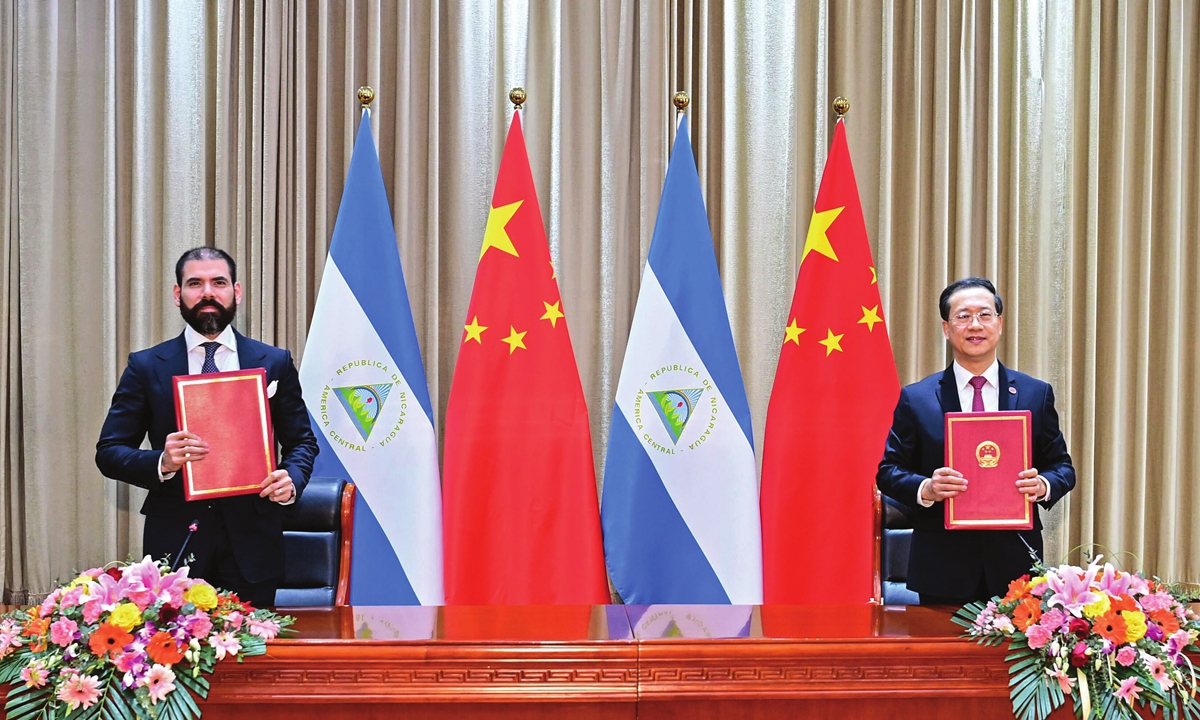
China's Vice Foreign Minister Ma Zhaoxu (right) and Laureano Ortega, the representative of the Nicaraguan government, display a joint communiqué to resume diplomatic ties between the two countries in North China's Tianjin on December 10, 2021. (Photo: Xinhua)
With the first batch of China-donated vaccines arriving in Nicaragua within three days after the two countries resumed diplomatic relations, a new chapter of cooperation in combating the COVID-19 and boosting bilateral trade and investment has quickly unfolded, as the historic move is expected to open a smooth passage for the two countries to collaborate more.
Beyond the vaccine donations, Chinese businesses are already starting to look at possible cooperation projects in a wide range of areas, including trade, infrastructure, agriculture and mining, while Nicaraguan officials and citizens are hoping that cooperation with China would improve economic development in the country, several businesses, insiders and experts told the Global Times on Monday.
The first shipment of 1 million doses of vaccines - totaling 200,000 doses - donated by China has arrived in Nicaragua, Bolivia-based news outlet Kawsachun News reported on Monday.
Supplied by Chinese medical giant Sinopharm, the donations were transported by an Air China plane, arriving together with a delegation of Nicaraguan government officials headed by Laureano Ortega Murillo, the presidential advisor for Investments, Trade and International Cooperation.
"On behalf of President Daniel Ortega and Vice President Rosario Murillo, the Nicaraguan people deeply appreciate this gesture of solidarity, cooperation, friendship and brotherhood of the people and government of China," Laureano Ortega Murillo tweeted.
The vaccine donation marked the first step, and an important one, toward cooperation between China and Nicaragua. China is offering timely help for the Central American country as its inoculation rate remained as low as around 30 percent, Zhou Zhiwei, a research fellow on Latin American studies at the Chinese Academy of Social Sciences, told the Global Times on Monday.
"With more communication and exchanges on the way as the two countries resume ties, bilateral trade - especially Nicaraguan exports to China - and China's direct investment in the Central American country are both expected to show significant growth," Zhou said.
Shen Qiang, a former expatriate employee of Chinese enterprises in Nicaragua and who has been in the country for three years, told the Global Times on Monday that when the news about China and Nicaragua resuming ties went viral online beginning on Friday, he started receiving more consultations from Chinese firms and individuals, totaling around 20, who expressed curiosity and expectations about the Central American country.
"There are not many Chinese businessmen here, only roughly 200 people. They basically welcome the resumption of diplomatic relations, which could greatly increase trade. They also support the severing of diplomatic relations between Nicaragua and the Taiwan island," said Shen, who has been operating a Nicaragua-themed Baidu Tieba, a Chinese online community, for three years.
Trade between the Chinese mainland and Nicaragua reached $506 million in 2020, of which China's export value was $487 million, data from China's customs bureau showed. The Chinese mainland's major exports included light industrial goods and textiles, computers and communication equipment, and motorcycles and bicycle parts, while its imports from Nicaragua included agricultural products, sugar, leather and wood.
It is believed the huge Chinese consumer market will play a significant role in boosting Nicaragua's exports, especially of agricultural products, which have remained a major category of exports from Central and South America to China. Nicaragua has been welcomed to take part in the International Import Expo held in Shanghai, where many foreign companies strike business deals with Chinese clients.
"Nicaraguan natives have always been very friendly to China and Chinese people, and some locals who are involved in and interested in politics are very supportive of the one-China principle. They have placed their hopes for the improvement of the country's economy on the Chinese, and they are all looking forward to restarting the Nicaragua Canal project," Shen said.
The Nicaragua Canal, which is about four times the length of the Panama Canal, was planned to connect the Atlantic Ocean and the Pacific Ocean upon its completion. In 2014, a Nicaraguan committee approved the route of the canal and the country has been attaching great importance to the project; however, the project has sparked some controversy.
Meanwhile, more infrastructure investment from Chinese state-owned enterprises could be expected to help boost the livelihoods of the Nicaraguan people.
An investment hotline staffer at China Railway Construction Corp told the Global Times on Monday that the company plans to conduct projects in the Central American country by playing on its advantage in infrastructure development, while attempting to develop local natural resources.
An employee of another state-owned infrastructure enterprise told the Global Times on Monday that there is no plan yet to invest in Nicaragua, because diplomatic relations have just resumed, but there will definitely be projects in the future.
China welcomed the Nicaraguan side to take part in global development initiatives, and enhance investment and infrastructure cooperation under the guidance of the Belt and Road Initiative, China's Vice Minister of Commerce Yu Jianhua said Friday, while holding a virtual meeting with Nicaraguan government delegates.
The Nicaraguan side said that it values cooperation with China in multiple spheres, including infrastructure, agriculture, mining, clean energy and the digital economy, adding that it will provide a favorable business environment for China and help Chinese enterprises to tap into the Central America market.
Though there are growing interests among state-owned companies, many private firms will likely adopt a wait-and-see approach when it comes to doing business in Nicaragua, some businessmen told the Global Times, citing various factors and uncertainties.
A Chinese businessman living in Mexico said that Mexico is far from Nicaragua, so the company is not likely to expand investment due to higher costs and the business environment in Nicaragua.


